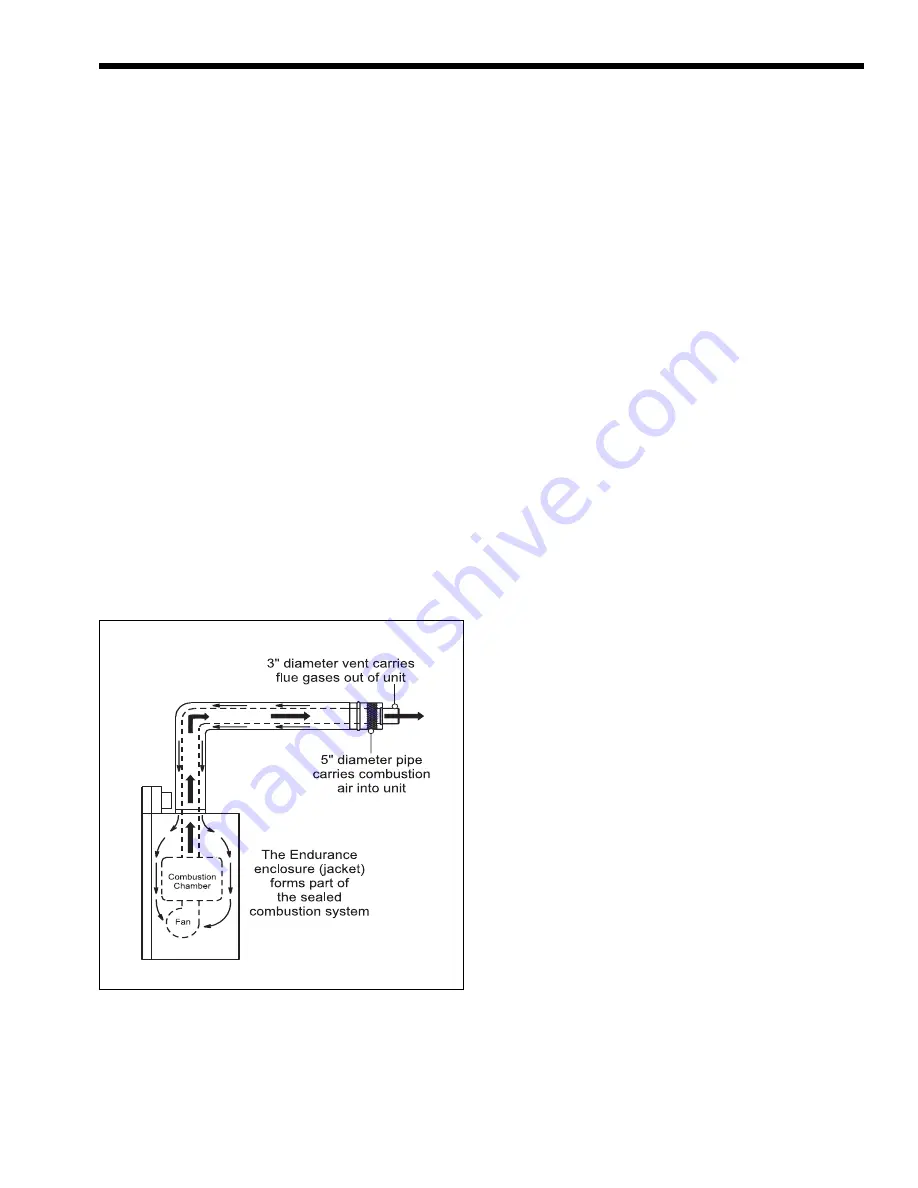
Endurance
Page 5
The following sections describe the requirements
for each of these methods.
IMPORTANT NOTE REGARDING ENDURANCE
VENTING: Regardless of the venting arrangement
being used, the flue gas vent material used with
the Endurance MUST be stainless steel special
gas vent listed to U.L. Standard 1738 and U.L.C.
Standard 636. Endurance flue gases must never
be vented into a masonry chimney or vented with
B-vent or other galvanized vent material.
Endurance units are not permitted to be common
vented with any other appliance(s), including
other Endurance appliances.
2.1 Concentric Direct Vent
2.1.1 Concentric Vent Description
Endurance concentric direct vent is a sealed-
combustion system. It can be used for vent systems
with a maximum of 15 linear feet (4.6m) and three
elbows. All of the air is drawn in from the outside
through a 5" stainless steel outer pipe. Flue gases are
vented through a 3" stainless steel pipe that is
positioned inside the 5" intake pipe. Hot flue gases are
surrounded by the intake flow of cooler outdoor air
(see Figure 4). Laars offers two concentric vent kits,
described in section 2.1.2. Laars concentric vents may
be installed through, and be in contact with,
combustible materials.
Figure 4. Combustion Air and Flue Gas Paths.
is part number 2400-009. The vertical vent kit is part
number 2400-011. See Figures 5 and 6, which show
the components included with the kits and venting
configurations. Installation instructions are included
with the kits. Rules for concentric venting, vent
material and vent terminal placement are discussed in
the rest of section 2 of this manual.
For additional length, and/or fittings, to extend
the kits to maximum 15 linear feet (4.6m) and three
elbows, individual components are available. These
components are shown in Figure 7.
2.1.3 Horizontal Concentric Vent
Location
The centerline of the vent opening must be at
least 16-1/2" (42cm) above grade, outside. Should it
be impossible to locate the opening centerline 16-1/2"
(42cm) above grade, use optional concentric vent
terminal extension (part number 2400-428), shown in
Figure 7.
In the U.S., vent terminals must be at least 3 feet
(0.9m) above any forced air inlet located within 10
feet (3.0m). In Canada, vent terminals must be at least
6 feet (1.8m) from any forced air inlet.
In the U.S., a direct vent terminal must be at least
12" (30cm) from any window or door that may be
opened, or any other nonmechanical opening. For an
Endurance that is not direct vented (vented as
Category IV), the vent terminal must be at least 4 feet
(1.2m) below or to the side of, and 12" (30cm) above
any such opening.
In Canada, a direct vent or non-direct vent
terminal must be at least 36" (91cm) from any window
or door that may be opened, or any other non-
mechanical opening.
The vent opening should be well away from
shrubbery or other obstructions that would prevent
free air flow to and from the vent terminal.
If the vent terminal location chosen is less than
18" (46cm) below an overhang, the 3" vent pipe must
extend to the outside edge of the overhang, to prevent
the accumulation of flue gas (see Figure 9).
Accumulating flue gas can contaminate the
combustion air, causing nuisance lockouts of the
ignition system. In addition, accumulation of flue
gases can settle on, and damage the structure’s
surfaces.
Vent terminals must not terminate in a location
where condensate or vapor may be a nuisance, hazard,
or could be a detriment to other equipment. See Figure
8 for more detail concerning vent terminal placement
in the U.S. and Canada.
Do not locate the vent terminal where blockage
by snow is a possibility, or where flue products could
strike against building materials and cause
degradation.
When multiple Endurance units are used, the
concentric vent terminals may be side-by-side,
2.1.2 Laars Concentric Vent Kits
The Endurance is certified with a maximum of
15 linear feet (4.6m) of concentric piping and three
sets of elbows. There are two concentric vent kits
offered by Laars. Both kits, and all Laars Endurance
vent material meet the requirements of U.L. Standard
1738 and U.L.C. Standard 636. The horizontal vent kit






































